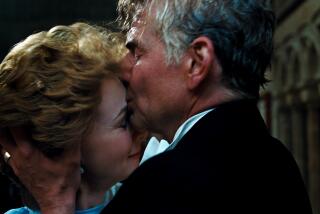DOCUMENTARY : GERMAN FILM ON BACH AT MUSIC HALL
- Share via
Musical biographies have never been particularly comfortable, or convincing, on the silver screen.
Amid their recent fund-raising hoopla orgies, the tastemakers at KCET revived a feebleminded, historically comical, Technicolored extravaganza, anno 1951, in which Mario Lanza and assorted accomplices flamboyantly dishonored the memory of Enrico Caruso. The local TV hypesters, incidentally, oozed breathless critical benedictions.
“Amadeus,” the modern-day equivalent of “The Great Caruso,” is more sophisticated. Filmed on location in Europe rather than on a Hollywood back lot, it is slick, elegant, overblown, melodramatic and historically comical. Clever on the surface, hopelessly mushy inside, it, too, offers instant culture and push-button uplift for the masses--at the expense of such minor technicalities as truth, integrity and credibility.
Under the circumstances, any respectable music lover would want to love “Johann Sebastian Bach,” Hans Conrad Fischer’s latest docu-biography which courts a select audience at the Laemmle Music Hall at 11 o’clock matinees for the next three Saturdays and Sundays.
The title alone is significant. Fischer doesn’t call his opus “The Great Bach” or “Sebastian” or “Passion According to Johann” or anything remotely lurid. It isn’t his style. He is, after all, more than a movie maker. He is a scholar, a researcher, a man of discernment.
As in his films about Mozart, Beethoven and Bruckner--which will grace the same series in May--Fischer tries to let the composer speak for himself. With excruciating care, the director-producer-writer explores the places where Bach worked, exposes all manner of iconography, dwells on paintings, buildings, manuscripts and related musicological documents. He also seeks out authoritative performers to provide generous musical examples within appropriate visual contexts.
He uses no actor to portray the epochal composer on the occasion of his 300th birthday--perish the ignoble thought--and he invents no dialogue. He even resists the temptation to put powdered wigs on the contemporary performers as they attempt to bring the ancient scores to life. The only wigs on the screen are seen in authentic Baroque portraits, and the words on the sound track are either Bach’s own--culled from letters and official records--or those of an enlightened narrator.
One has to admire the inquisitive eye of Fischer’s camera. The film brims with telling detail, as well as with atmospheric vistas of a Germany untouched by time. One has to savor the stylish music-making of such paragons as Helmuth Rilling, Karl Richter, Theo Adam and Peter Schreier. One has to be intrigued by a churchly and courtly travelogue that tours Eisenach, Coethen, Weimar and Leipzig (“Bach” is a co-production of Fischer Films, Austrian Broadcasting and, most significant, National Television of East Germany).
One has to find welcome illumination in research that concerns itself, to some degree at least, with the sociological and psychological dilemmas of Bach’s life as well as the aesthetic ones. One also has to be just a bit bored.
Bach, alas, was not a particularly flamboyant nor particularly appealing character. In fact, he was a rather solid, stolid, workmanlike burgher who cranked out music on command and by the yard, and who worried a lot about money and personal power.
Fischer, obviously overcome with awe for Bach’s creative genius, contents himself with static images, repetitive illustrations, dutiful performances by unsmiling virtuosos and a British-flavored narration that lends new dimension to the concept of stilted.
He takes no liberties. For two nobly intentioned, increasingly ponderous, eminently cautious hours, he smothers his subject--and his audience--in intelligence, refinement, taste and reverence.
There still must be a better way.
More to Read
The biggest entertainment stories
Get our big stories about Hollywood, film, television, music, arts, culture and more right in your inbox as soon as they publish.
You may occasionally receive promotional content from the Los Angeles Times.










